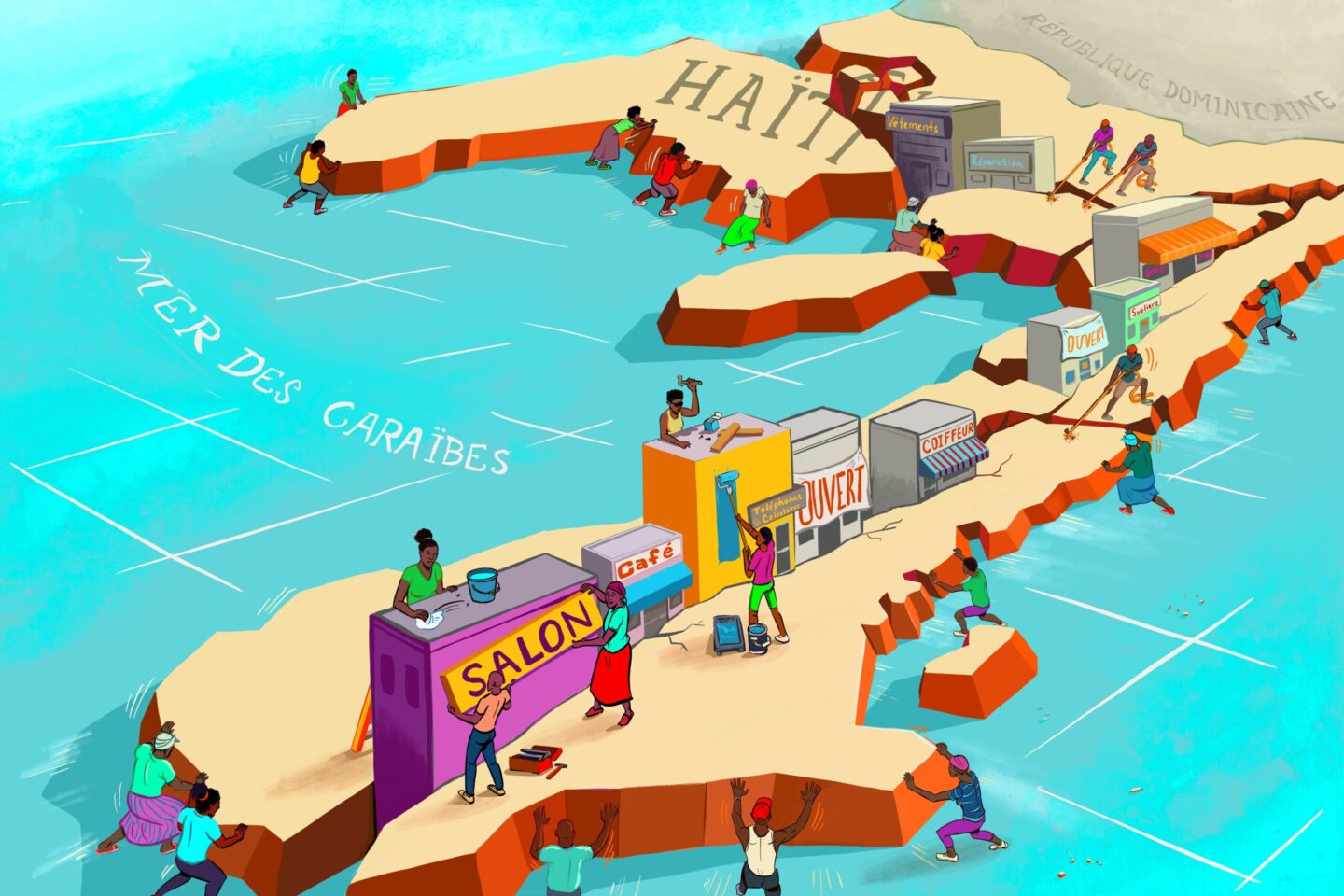Summary: Some business owners cling to their choice, that of staying despite this chance to leave Haiti which is offered to them
Reporter Byline: Anne Myriam Bolivar, GPJ Hait
Illustration Credit: Matt Haney, GPJ
“This article was originally published by Global Press Journal »
PORT-AU-PRINCE, HAITI: Mathilde Ménélas has not forgotten anything about the moment when her parents sold their land to give her the proceeds of the sale in cash, ordering her to leave her country. However, she had never known a country other than her home. But this 26-year-old young woman didn’t see it that way. Open a beauty salon in Port-au-Prince, Haiti’s bustling capital, rather than leaving. This was his choice.
A beautician by training, she knows that her parents are right to fear about her fate living in a country plagued by ills as varied as threats of kidnapping and natural disasters, economic instability and rising unemployment. According to Menelaus, his only concern was to leave his country.
“Before, it was like an obsession,” she admits. “Listening to the news and seeing the situation around us, there was no choice but to leave the country. Now, seeing my friends coming back, I had another idea: to fight.”
Owner of a salon, she is among the growing number of young Haitians who refuse to give in to the pressure from their families who, out of fear, order them to leave Haiti. These young people, rather than complying, prefer something else: to stay and create their own work opportunities.
Menelaus decided this for a reason: a son of his neighbors was sent back to Haiti two months after receiving money from his parents to start a new life elsewhere.
“Things went badly, and he lost all his money,” laments Menelaus. “That’s when I put myself in his shoes and started thinking about what I would do if I lost my money. I started to wonder how I could make a living here.”
Two years after this life-changing decision, Ménélas now runs a thriving salon offering services including facials, hair braiding and manicure services, with a sideline sales business. makeup products and clothing. During busy periods – around Easter, for example – she employs up to four people and helps pay her brother’s school fees. However, according to Ménélas, running a business in Haiti attracts a lot of security problems.
“At any time when we are at the salon, someone could come in and ask us to empty our cash register, remove a customer, or ourselves, so we look out for each other, [et] we help each other with security,” says Ménélas. “We can’t say it won’t happen, but at least it helps us feel a little reassured when we’re inside the show.”
In addition to participating in a collective effort to ensure the safety of neighboring businesses, Ménélas ensures that his salon is always locked, that visits are by appointment only and that trips made to obtain supplies are carefully planned. taking into account security.
In a country where youth unemployment is, we read in a 2020 United Nations report, a “destabilizing factor which affects 30% of people aged 15 to 24 and which contributes to the spread of armed gangs and criminal networks”, many young people find it difficult to envisage a future in Haiti and their perceptions as well as their loyalties are also tested in the face of successive crises.
The assassination of the president, which occurred in July 2021, plunged the country into a deeper political, economic and humanitarian crisis. The following month, a devastating earthquake struck, killing 2,248 people. Following this earthquake, if we are to believe United Nations estimates, more than 40% of the population will need humanitarian aid this year.
Despite this disastrous situation, Cynthia Louis – an administration and commerce student – who runs a lingerie business based in Haiti, says that leaving the country will not change the situation one iota.
“If we all leave, who will take over? » asks Louis. “It’s difficult to find work, but you can’t stop creating.”
In the last three and a half months of 2021, more than 13,000 adult Haitians were returned home, mainly from the United States, but also from the Bahamas, Cuba, Mexico and other countries, according to the Organization International Organization for Migration (IOM). According to the survey conducted by this organization among 383 deported people chosen at random out of a total of 13,351, almost 70% of recently deported adults are aged 24 to 35.
According to those who remain in Haiti, we are witnessing different initiatives and organizations that help and encourage young people to start a business. In 2021, the Association of Volunteers for Democracy (AVD), a Haitian non-profit organization created in 2005 and dedicated to preparing young people for leadership roles, organized a competition with cash prizes for the best business ideas.
“If we all leave, who will take over? »
CYNTHIA LOUIS, STUDENT AND ENTREPRENEUR
Lunda Datus, director of youth and integration at the Ministry of Youth, Sports and Civic Action, affirms that, despite ad hoc initiatives and entrepreneurship training for youth organizations and individuals, the ministry cannot meet the needs of the country’s youth in the absence of joint efforts.
According to a 2020 report from the United States Agency for International Development (USAID), “young entrepreneurs [en Haïti] suffer from a lack of technical assistance, capital and training on innovation. This report calls for the development of “youth entrepreneurship programs that encourage innovation through activities such as competitions, technical assistance and start-up funds, without forgetting particular support for young women”.
Young entrepreneurs, as this report indicates, face many obstacles, including insufficient skills, experience, equity, entrepreneurship training and networks.
Jimmy Victor, a 23-year-old management student, does not deny the lack of opportunities for young people, before adding that it is the reason he started his own business. Using a three-wheeled motorcycle to sell water, the success of this business allowed him to invest in another vehicle and employ two people.
According to Victor, young people should stay and start their own businesses, thus benefiting the community. “Although things are difficult, giving up should not be an option,” he says.
In the meantime, Menelaus regrets nothing.
“I understand that life is difficult here, but we have to create something to live,” she advises. We are not at war, but we are the ones preventing each other from growing and prospering. We all dream of a country where everything is better.”
“Global Press Journal is an international, award-winning, nonprofit publication that employs local women journalists in more than 40 independent news outlets across Africa, Asia and Latin America.”











